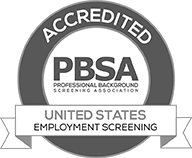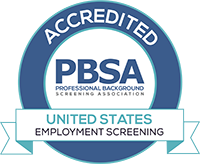BLOG
Connecticut’s Criminal Records Erasure Bill
December 6, 2022
About The Act
In 2021, Connecticut legislators considered Public Act 21-32 (also known as Senate Bill 1019), which would permit residents to have various types of misdemeanors and a few low-level felonies expunged. It also clarified that certain types of records would not be eligible, such as:
- Class A, B or C felonies
- Convictions for violent crimes
- Most sexual offenses
The bill passed in the House and Senate and was signed by Governor Ned Lamont. It goes into effect on January 1, 2023.
What Employers Should Know
Public Act 21-32 establishes a variety of employment-related protections for people who have criminal records expunged. It states: “No employer shall inquire about a prospective employee's prior arrests, criminal charges or convictions on an initial employment application, unless (1) the employer is required to do so by an applicable state or federal law, or (2) a security or fidelity bond or an equivalent bond is required for the position for which the prospective employee is seeking employment.”
Employers in Connecticut will also be prohibited from publishing job advertisements that are designed to restrict employment opportunities for individuals who have criminal records erased. They may ask questions about criminal history on their job applications, but must also include a clear and conspicuous statement which informs the reader they are not required to disclose the existence of any expunged records.
Public Act 21-32 notes that no employer or employer's agent, representative or designee may require an employee or prospective employee to disclose the existence of erased criminal history record information. It also says that employers may not deny employment because an applicant has expunged one or more criminal records or received a pardon for a prior conviction.
Organizations that operate in Connecticut are encouraged to consult with legal counsel to ensure their hiring and background screening policies are compliant with this and all other relevant legislation.
The Second Chance Movement
Second Chance laws are intended to give people who have criminal records new opportunities to find employment, housing and other necessities. Numerous studies have shown that having any type of records can make it difficult for a person to rejoin society. By passing Public Act 21-32, legislators hope to reduce recidivism and increase the number of eligible applicants hiring manager have available to them.
Laws that fall under the Second Chance umbrella cover a variety of topics. Many include language that calls for lower-level offenses to be automatically expunged. Some stipulate that employers may not inquire about an applicant’s criminal history until they have otherwise deemed the person is qualified. Others take it a step further and say that employers must individually assess any records that are found to determine if they are relevant to the position. However, in every scenario, organizations are encouraged to run comprehensive background checks on all their candidates. These reports help hiring managers make informed decisions and perform due diligence.
Need Background Checks
If your company needs background checks for potential employees, contractors or volunteers, please contact us. Our team takes pride in providing current, accurate and reportable data that helps our clients identify strong candidates.
We can customize screening packages based on your specific needs and are available to assist you Monday through Friday from 5am to 6pm PT.
#ConnecticutLaw #Expungement #SecondChances #BackgroundChecks







